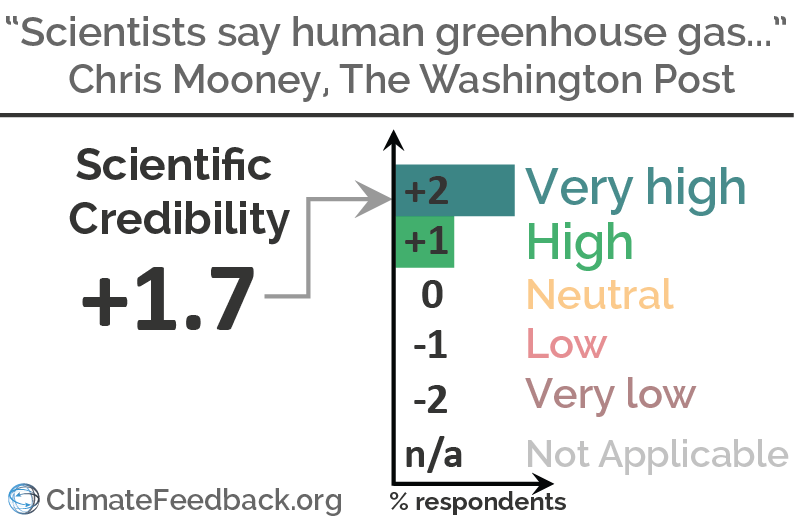- Climate
Analysis of "Scientists say human greenhouse gas emissions have canceled the next ice age"
Reviewed content

Published in The Washington Post, by Chris Mooney, on 2016-01-13.

Scientists’ Feedback
SUMMARY
The article presents an accurate account of recently published research which suggests that human-induced global warming will delay the onset of the next ice age by 50,000 years. The research supports the findings of several studies published over the past 15 years, and is consistent with the scientific consensus that human activity is changing the climate with very long-term consequences. Although anthropogenic greenhouse-gas emissions will likely delay the onset of the next ice-age, this is no cause for complacency. As the research notes, at pre-industrial levels of CO2 the planet would not descend into an ice age for another 50,000 years. By contrast, the adverse consequences of global warming are expected to intervene in the coming years, decades and centuries.
See all the scientists’ annotations in context
GUEST COMMENTS

Professor, PennState University
That atmospheric carbon dioxide buildup from fossil fuel burning likely will delay the onset of the next glaciation is actually old news; the last emergence of the idea I’m aware of was in 2008, in an article reporting on the work of University of Chicago geoscientist David Archer. The new idea that emerges from the recently published work of Ganopolski et al. is that even if preindustrial levels of 280 ppmv atmospheric CO2 had been sustained to the present and beyond, Earth would have enjoyed an anomalously prolonged warm, interglacial state compared to past interglacials. This finding appears to be robust, but should be evaluated using other earth system models appropriate to study the complicated process of glacial inception.

Senior Scientist, Carnegie Institution for Science
One thing to be aware of is that this conclusion is not new. For instance, Uchikawa and Zeebe (2008), using a model based on that of Walker and Kasting (1992) came up with the same conclusion, as well as Archer and Ganopolski (2005) who concluded: “We predict that a carbon release from fossil fuels or methane hydrate deposits of 5000 Gton of Carbon could prevent glaciation for the next 500,000 years”. That is not to belittle the present article, who has performed more sophisticated ice sheet modeling than in previous studies. Thus, I would see the new study as giving us greater confidence in conclusions reached by Ganapolski and others in earlier publications.
REVIEWERS’ OVERALL FEEDBACK
These comments are the overall opinion of scientists on the article, they are substantiated by their knowledge in the field and by the content of the analysis in the annotations on the article.
The IPCC’s latest projections for sea level rise by century’s end (e.g. IPCC summary for policymakers) range from 40 cm to 63 cm (or 15″ to 25″). A notable component of that will be due to ice loss. So while our carbon emissions may have initially delayed an ice age, this benefit has been traded for the likelihood of fairly adverse consequences in the future.

Professor, Victoria University of Wellington
The article is essentially a factual account of the content of the paper, and the material (in the paper and in the WaPo article) covers ideas that have been current for several years, that human-induced greenhouse gases increase has delayed the next ice age.

Researcher, CEREGE
The article fairly reports on one of the findings of one article that has recently been published in the scientific journal Nature. On multi-millenia timescales, orbital parameters are considered as pacemakers of ice ages, but now that CO2 has massively been injected in the atmosphere the next ice age which should have already been much into the pipeline is already aborted.
The article indeed talks about many things clearly established for decades, but that are still valid.

Senior scientist, The Norwegian Meteorological institute
The reporting of the research is objective, although the research itself may be perceived as a bit speculative at this point, even if its plausible. The results are interesting, and need to be confirmed through further work.
This is a nice article which reports on a recent Nature study accurately. However, for the sake of clarity and to avoid potential misinterpretations of such results, the implication that human greenhouse gas emissions have “canceled the next ice age” (in 50,000 years) could have been compared with the implications for near-term global warming.
Article continues the tradition of excellence in climate and energy reporting by Chris Mooney and others at the Washington Post. Clearly explains state of the science, though I would have liked to see other anthropogenically and naturally influenced climate forcers (especially aerosols and methane) brought into the discussion.
Notes:
[1] See the rating guidelines used for article evaluations.
[2] Each evaluation is independent. Scientists’ comments are all published at the same time.



